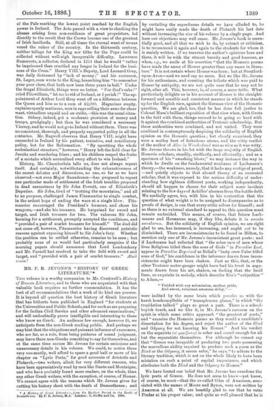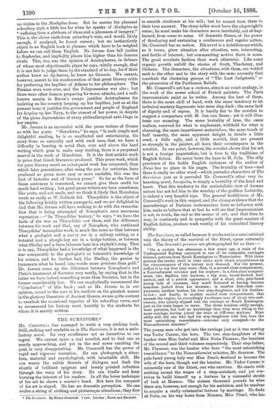MB. F. B. JEVONS'S "HISTORY OF GREEK LITERATURE."
Tun volume is a worthy companion to Mr. Cruttwell's History of Roman Literature, and to those who are acquainted with that valuable book requires no further commendation. It has the best of all recommendations that a work of its kind can possess. It is beyond all question the best history of Greek literature that has hitherto been published in England "for students at the Universities and Public Schools, and for such as are preparing for the Indian Civil Service and other advanced examinations," and will undoubtedly prove intelligible and interesting to those who know no Greek. An audience few enough, however fit, we anticipate from the non-Greek reading public. And perhaps we may hint that the ubiquitous and puissant influence of examiners, who are far, as a rule, from being patterns of sound judgment, may leave these non-Greeks something to say for themselves, and at the same time excuse Mr. Jevons for certain omissions and unnecessary details in his volume. We could, to notice these very summarily, well afford to spare a good half or more of his chapter on "Lyric Poets," for good accounts of Aristotle and Plutarch,—two writers, albeit for very different reasons, who have been appreciatively read by men like Dante and Montaigne, and who have probably found more readers, on the whole, than any other Greek writers, with the exception, of course, of Homer. We cannot agree with the reasons which Mr. Jevons gives for cutting his history short with the death of Demosthenes ; and • A History of Greek Literaters, from the Earliot Period to the Death of Donostlunes. By F. B. Jevons, M.A. London : C. Galin and Co. 1886. by curtailing the superfluous details we have alluded to, he might have easily made the death of Plutarch his last date without increasing the size of his volume by a single page. And here our objections may well cease. Mr. Jevons's book is essen- tially good, and all that we wish to do, by extract or criticism, is to recommend it again and again to the students for whom it is mainly written. If we traverse the author's opinions here and there, it will be with the utmost brevity and good humour, as when, e.g., we smile at his assertion "that the Homeric poems have made the name of Homer greater than any name in litera- ture." It is not certain where Homer was born ; but at Stratford- upon-Avon—and we need say no more. But we like Mr. Jevons for his enthusiasm, and counting the tribute which was paid to Homer by antiquity, we are not quite sure that he may not be right, after all. This, however, is, of course, a mere trifle. What particularly delights us in his account of Homer is the straight- forward and sensible aud consistent manner in which he stands up for the English view, against the German view of the Homeric question. We are glad, too, that he has done full justice to Colonel Mare's brilliant exposition of that view when, with Grote in the field with them, things seemed to be going so hard with it against the combined authorities of Teutonic scholarship. But these authorities were combined, and not united. They were combined in contemptuously despising the solidarity of English opinion on the Homeric question ; but closely examined, they were a motley host of fortuitous atoms, and the witty verdict of the author of Alice in Wonderland was as wise as it was witty. Mr. Jevons throws in his lot with the large majority of English Homeric scholars, steadily, stedfastly, and effectually ; and as a specimen of his " mashing blows," we may instance the way in which he dwells on the fundamental weakness of Lachmann's theory,—the weakness, namely, that it lacks any vestige of proof, —and quietly objects to that absurd theory of an overrated scholar, that it was exposed to the serious difficulty of under- standing how eighteen different poets, working independently, should all happen to choose for their subject some incident relating to the few days of Achilles' absence from the battle-field. We cordially agree, too, with him in his contention that the question of what weight is to be assigned to discrepancies as to proofs of design, is one that every critic solves for himself ; and as there is no external standard to appeal to, this question must remain undecided. This means, of course, that future Lech- manna and Hermanns may, if they like, debate it in, acecula sceculorunt. But the solidarity of English opinion, we are right glad to see, has increased, is increasing, and ought not to be diminished. There are inconsistencies to be found in Milton, to mention only one of Mr. Jevons's inconsistent great poets ; and if Lachmann had reflected that "the sober race of men whose lives Religions titled them the sons of Gods" in Paradise Lost, appear in Paradise Regained as Belial's "lusty crew False titled sons of God," his confidence in the inference drawn from incon- sistencies might have been shaken. Just as this, that, or the other Teutonic metre-gauger might have had his trust in argu- ments drawn from his art, shaken, on finding that the lucid lines, so exquisite in melody, which describe Eve's "subjection" to Adam,— " Yielded with coy submission, modest pride, And sweet, reluctant amorous delay,"— were indited by the same brain which puzzles us with the harsh hendecasyllable of " transpicuous gloom," in which "the trepidation talked" plays so great a part. There is a school- boyish touch, and we like it, in Mr. Jevons's sarcasm on the spirit in which some critics approach "the greatest of poets," and "examine the Homeric poems as they would a candidate's dissertation for his degree, and reject the author of the Iliad and Odyssey for not knowing his Homer." And his verdict on the separists (of X CagGlerE;) is sober and sound enough for all but the separatists themselves. For although he cannot say that "Greece was incapable of producing two poets possessing the marvellous ability required to produce such a poem as the Iliad or the Odyssey, it seems safer," he says, "to adhere to the literary tradition, which is not on the whole likely to have been mistaken on such a point of capital importance, and which attributes both the Iliad and the Odyssey to Homer."
We have hinted our belief that Mr. Jevons has overdone the lyric poets of Greece. He does not seem to know—yet know, of course, he must—that the so.called Odes of Anacreon, asso- ciated with the names of Moore and Byron, were not written by Anacreon at all. We are heartily glad to see that he rates Pindar at his proper value; and quite as well pleased that he is no victim to the IEschylus fever. But he carries his pleasant schoolboy style a little too far when he speaks of JEschylas as " suffering from a plethora of ideas and a pleonasm of imagery." This is the clever sixth-form prize-boy's vein, and would, likely enough, if analysed, be found correct ; but we instinctively object in an English book to phrases which have to be weighed before we can call them English. Mr. Jevons does full justice to Sophocles, and implicitly places him higher than his famous rivals. This, too, was the opinion of Aristophanes, in defence of whose most objectionable plays he says, wittily enough, that it is not fair to judge them by the standard of to-day, for if their author knew no fig-leaves, he knew no Genesis. We cannot, however, assent to his condemnation of that great literary critic for preferring the hoplites of Athens to her philosophers. The Persian wars were over, and the Peloponnesian war also ; but there were other foemen preparing for worse attacks, and a well- known maxim in Bacon's essays justifies Aristophanes for insisting on his country keeping up her hoplites, just as at the present hour it justifies the government and people of England for keeping up her Navy, to the utmost of her power, in despite of the pions deprecations of every philanthropical anti-Jingo in her empire.
Mr. Jevons is as successful with the prose writers of Greece as with her poets. "Herodotus," he says, "is such simple and delightful reading, he is so unaffected and entertaining, his story flows so naturally and with such ease, that we have a difficulty in bearing in mind that, over and above the hard writing which goes to make easy reading, there is a perpetual marvel in the work of Herodotus. It is the first artistic work in prose that Greek literature produced. This prose work, which for pure literary merit no subsequent work has surpassed, than which later generations, after using the pen for centuries, have produced no prose more easy or more readable, this was the first of histories and of literary prose." So far as the form of these sentences is concerned, we cannot give them credit for much hard writing ; but great prose writers are born sometimes, like poets, and not made, and we think it likely that Herodotus wrote as easily as W. Cobbett did. Thucydides is the object of the following briskly written panegyric, and we are delighted to find that Mr. Jevons will have nothing to do with the resuscita- tion that is being attempted of Xenophon's once enormous reputation :—" In Thucydides' history," be says, "we have the facts of the war as Thucydides saw them, and the difference between his work and that, say of Xenophon, who continued Thucydides' incomplete work, is much the same as that between what a geologist and a navvy see in a railway cutting, or a botanist and a plough-boy see in a hedge-bottom, or between what Shelley and a farm-labourer hear in a skylark's song. That is to say, Thucydides had a knowledge of what happened in the war comparable to the geologist's or botanist's knowledge of his science, and he farther had, like Shelley, the genius to transmute what he heard into words more precious than gold." Mr. Jevons sums up the difference between Xenophon's and Plato's treatment of Socrates very neatly, by saying that in the latter we have indeed something more than Socrates, but in the former considerably less. We can emphatically recommend the "Conclusion" of this book ; and as Mr. Jevons is, in our opinion, sound to the core in his verdicts on the greatest names in the glorious literature of Ancient Greece, we are quite content to overlook the occasional vagaries of his schoolboy verve, and to recommend his history most heartily to the students for whom it is mainly written.



































 Previous page
Previous page